Iran Grants U.N. Watchdog Access to Suspected Nuclear Sites

Iran agreed to allow United Nations inspectors access to two sites where it is suspected of carrying out illicit nuclear-weapons work in the past, bowing to months of pressure in a bid to salvage backing for the 2015 nuclear deal.
European powers and the U.S. have long pushed Iran to cooperate with a probe by the International Atomic Energy Agency, the U.N.’s nuclear watchdog, into undeclared nuclear material in the country. Granting access to the sites now could help deflect pressure from Washington, whose attempt to reimpose multilateral sanctions on Tehran is facing broad international opposition.
Under Wednesday’s agreement, Tehran said it would permit access to the sites, while the IAEA said it would take into consideration Iran’s security concerns by protecting confidential information. One site is outside Tehran and the other is near the city of Isfahan.
IAEA Director General Rafael Grossi sealed the agreement after a three-day visit to Iran that concluded Wednesday.
Inspectors will take environmental samples to check for traces of undeclared nuclear material. They will likely take several months to process, making any reimposition of sanctions unlikely before the U.S. election in November.
The agreement comes as the Trump administration faces widespread international opposition to its attempts to kill the 2015 nuclear deal between Iran and six world powers, which imposed restrictions on Iran’s nuclear activities in exchange for the lifting of international sanctions.
The Trump administration withdrew from the deal in 2018 and reimposed sanctions on Iran. It has sought to pressure particularly the European parties to the accord to leave the deal as well.
Earlier this month, the U.N. Security Council rejected a U.S. proposal to extend a five-year conventional arms embargo on Iran, which is set to expire in October as part of the nuclear deal. On Tuesday, a near-unanimous Security Council said it wouldn’t act on a bid from Washington to snap back all international sanctions on Iran, saying the U.S. can’t reinstate the sanctions after withdrawing from the accord that provides such authority.
Many restrictions in the 2015 deal gradually expire, and the U.S. and Israel say Iran can’t be trusted not to build nuclear weapons in the future.
The IAEA’s probe into Iran’s nuclear activities started after Israel in 2018 uncovered thousands of Iranian documents detailing past nuclear work and identified a Tehran site where inspectors later found traces of undeclared nuclear material.
That led to further questions and requests for access to the two sites in January, which Iran stymied. While most experts and diplomats say the undeclared nuclear material is likely left over from work Tehran did many years ago, Iran’s refusal to explain it runs against its commitments under the global nuclear nonproliferation agreement.
While Iran presented Wednesday’s agreement as ensuring a new and fairer approach to the probe, the agreement essentially recognizes the IAEA’s rights to unrestricted access to gain full knowledge of Iran’s past activities.
Iran has claimed the agency was being misled by information fabricated by Israel—a stance the IAEA has dismissed, saying it corroborated all the information it had received.
By recommitting to cooperate with the agency, Iran could face questions and demands for access to sites that could expose any past nuclear-weapons work beyond any doubt.
In an apparent concession, the joint statement said, “In this present context, based on analysis of available information to the IAEA, the IAEA does not have further questions to Iran and further requests for access to locations.” It did, however, leave open the possibility of more demands, depending on the agency’s findings.
Mr. Grossi has accelerated the probe into undeclared nuclear material in Iran since taking over as head of the IAEA last December. In July, he told The Wall Street Journal he was prepared to step up pressure on Iran if it continued to deny weapons inspectors access to the sites.
Iran has stonewalled the agency on several issues, including the presence of an undeclared metal disk made of natural uranium between 2002 and 2003 at a location that was later largely destroyed. The whereabouts of the disk, which could be used as a nuclear-weapon component, are unknown.
Iran has always said its nuclear program was for civilian purposes and denied it ever worked on atomic weapons, despite Western evidence of an active nuclear-weapons program in the 1990s and early 2000s.
Photo: Iranian President Hassan Rouhani met with IAEA Director General Rafael Grossi, left, in Tehran on Wednesday. - PHOTO: PRESIDENT OFFICE HANDOUT/SHUTTERSTOCK




